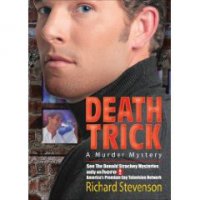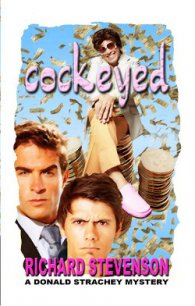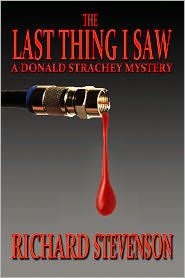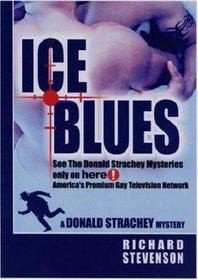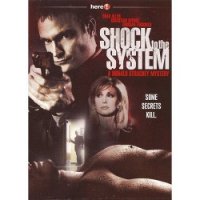On the Other Hand, Death - Stevenson Richard (книги без регистрации полные версии TXT) 📗
"Yes," Dot said. "I'll do that right away."
Dot hung up and entered the supermarket, the basket dangling from her arm. Her voice came out of the radio speaker again.
"He told me—I hope you can hear me, Lieutenant Bowman. The man told me to go inside the store and
to ... to buy a chuck steak. That's what he said. And then to go back outside and wait by the telephone."
Bowman writhed in his seat. "A chuck steak. Shit. He couldn't have said a chuck steak. Strachey, is the old doll hard of hearing, or what?"
"Not that I know of. I'd say no, she isn't."
"Oh, my land!" Dot's voice again. "My word, I didn't bring a cent with me. All I have is the money in the basket! Well, that will just have to do. Let's hope they can't count."
Bowman squirmed some more, shook his head. "I don't believe this is happening."
"I've got the steak," Dot said after a minute. "It's a bit fatty, but fine for stew. The roasts look nice, but the man said steak, so steak it is."
From our position across the highway we watched a dark blue Dodge identical to Bowman's pull into the Price Chopper lot, come to a stop at the edge of the woods on the western side of the lot, and douse its lights.
A young, tired female voice said, "That's four sixty-seven."
There was a pause, during which Dot's heartbeat quickened.
"Don't you have anything smaller than a hundred?" the cashier asked wearily.
"No, I'm sorry— Oh! Aren't those nice little TV sets! Just what I need for the den. I believe I'll just take one of those along. How much are they?"
"Eighty-nine ninety-five. There'd be sales tax on that too."
"Oh. Yes. And how much would that make it?"
A silence. Then: "Ninety-five thirty-four for the TV. And four sixty-seven for the meat."
"Fine," Dot said. "That's just fine."
Click, click, ring.
"That'll be one hundred dollars and one cent."
The heartbeat again. I thought I detected a slight mitral valve prolapse.
"Oh, heavenly days, I seem to have only another—"
"Forget the penny," the young woman said.
"Oh, thank you. Thank you so much."
"Have a nice night."
"Yes. You too."
She came into view again, the picnic basket over her right arm, a grocery bag clutched in her right fist. Her left hand grasped the handle of a small portable television set.
Dot quickly placed the TV set in the back seat of her car, then went and stood by the phone again. She said, "Do any of you have a hundred dollars? What if they count it?"
Bowman froze, but Dot made no move away from the phone.
A minute went by.
"Where the hell are they?" Bowman rasped. "What kind of crazy goddamn treasure-hunt-of-a-stunt are they pulling this time?"
The phone rang, startling all of us.
"Hello?"
Then another voice on the police radio: "Phone company's got it, Lieutenant. We're patching."
"Do it."
"—and go home. And take all those fuckin' cops with you!
"But there are no policemen with me. As you can see— Can you see me? I'm alone. I wouldn't let them come."
"You just do like I said, missus!"
"Is Fenton nearby? Are you releasing him now?"
"Just do what I said."
"All right. I'm doing it now." Dot hugged the receiver between her neck and shoulder so that both hands were free. She bent down, took the package of meat out of the grocery bag and seemed to unwrap it. "I'm placing the meat in the basket," she said. "And now I'm putting the basket down on the pavement by the phone."
Bowman and I both said it at once—"A dog!"—as the form shot out of the woods on the eastern edge of the parking lot, snatched up the basket handle between its teeth, and hurtled back across the tarmac and into the deep woods.
"Oh, my stars!" we heard Dot shout. "Get back here with that! Get back here, you damnable mutt!"
She was exclaiming only to herself and to us. The phone line had gone dead.
"Salazar, around the block! Boyce, you follow me! There's a street on the other side of those woods!"
We sped down Western a third of a mile, then hooked sharply left onto a side residential street that paralleled the woods the dog had run into. The street dead-ended after a block, and the woods spread out to the left and right. We couldn't see the end of them in any direction.
We leaped from the car and stood listening. We heard peepers.
While Bowman and the eight or ten other patrol cars that suddenly materialized rushed pell-mell up and down the streets and back roads of Guilderland, I jogged back to the Price Chopper parking lot. Dot was seated in the driver's seat of her car, the radio on, tuned to WAMC. The midnight jazz show was on, with Art Tatum playing "Sweet Lorraine."
I climbed into the car and we sat and listened for a few minutes. Neither of us spoke. When the song ended, we exchanged seats and I drove us back to Dot's house. Edith
was waiting in the kitchen, and we all had a sandwich and a beer.
No one said much. Dot and Edith were exhausted, defeated. I was watching the clock, and waiting.
22
• At one-twenty the patrolman guarding the Fisher farmhouse received a call from Bowman inquiring whether Dot had gotten home safely. He was informed that she had. Bowman reported that no trace of the kidnappers, the dog, or the basketful of meat and money had been found, but that the woods and streets in a six-square-mile area were being combed. As the patrolman passed this information on to me, I heard a helicopter roar overhead.
At 1:25 a.m., with the temperature at 80 degrees, Dot and Edith went out for a dip in the pond. They wore bathing suits this time.
At exactly one-thirty I dialed Newell Bankhead's number. The line was busy. I got hold of the operator and informed her that Mr. Bankhead's grandmother had been killed when the bus she'd been riding in plunged over a cliff on the outskirts of Katmandu, and would the operator please interrupt Bankhead's conversation? She grilled me according to phone company protocol, duly noted my lies, was gone for a few seconds, and then put Bankhead on the line.
"Newell, I'm sorry to be the one to break the news to you, but your grandmother Ruby Gentry was killed when the bus she'd been riding in plunged over a cliff on the outskirts of Katmandu."
He chuckled. "My, my. Sorry to hear it."
"I thought you'd want to know. So, what did you find out?"
"Six people hung up on me, and several others hung up on some friends of mine who called around. But I've got a list that's pretty complete, I think. There are fifty-eight names. Do you want to write them down?"
"I'm set. All these people work in pathology or in ER, and they're all gay?"
"These are the ones we're sure of. I've got another list of eighteen deep closet cases we can't be certain about but would be willing to bet money on."
"I'll take them all, cat owners first."
"We came up with sixteen of those. There are sure to be more, but these are the ones we know about."
"Shoot."
Bankhead dictated the list and I copied it down in my notebook, filling five pages. Several of the names I recognized from the earlier list he'd given me at his apartment.
When he'd finished, I said, "I know I didn't ask you this before, Newell, but on the off chance you can help me out, what about dogs?"
